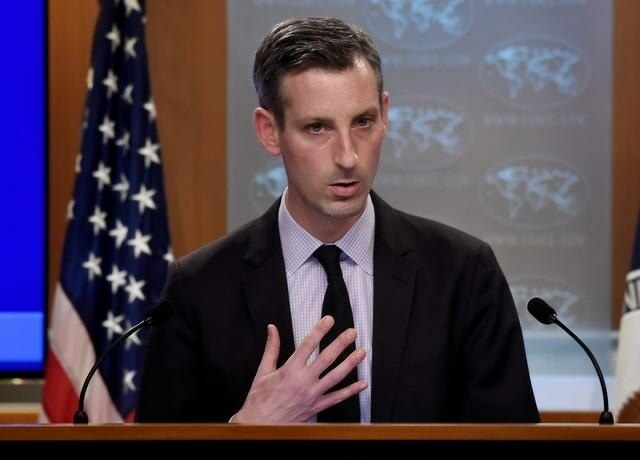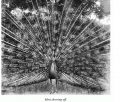State Dept Presser, June 16, 2022

Ned Price, State Department Spokesperson fielded a wide range of questions at his presser on June 16.
 EXCERPTS
EXCERPTS
QUESTION: Have you managed to get any more information about the Americans who have allegedly been captured or detained in Ukraine?
MR PRICE: ….We are aware of unconfirmed reports of two U.S. citizens captured in Ukraine. We’re closely monitoring the situation. We are in contact with Ukrainian authorities, as well as with the International Committee of the Red Cross and the families of the two reported missing U.S. citizens. Of course, we’re not able to offer any more on that front because of privacy considerations.
But the broader message – and this is something you’ve heard from us previously, and it’s one we reiterate again today – is that we continue to urge in every way we can American citizens not to travel to Ukraine because of the attendant dangers that is posed by Russia’s ongoing aggression. There are many individuals in this country who are well-intentioned and who want to do everything they can to help the people of Ukraine. Of course, we all understand that. There are avenues and ways to channel that energy, to channel those efforts in ways that are constructive and ultimately helpful for the people of Ukraine, and you can find many of those on our website.
QUESTION: — one more on Ukraine! Several European leaders visited Kyiv today and they voiced support for European Union membership for Ukraine. Obviously, the U.S. isn’t part of the European Union, but do you have any stance on this in terms of what this means and what this could mean also potentially for NATO aspirations in the future for them?
MR PRICE: We certainly support Ukraine’s European aspirations. Our support since Ukraine’s independence has been to help place Ukraine on the path to help support its European aspirations. We continue to, and to this day, continue to work with Ukraine to realize those aspirations. Obviously, this is a question for the EU, but it is also an aspiration that we fully support.
QUESTION: Thank you. On Russia, China, and North Korea, in a recent phone call with Russian President Putin, Chinese President Xi Jinping said the Russian war was justified and supported Russia. What is your comment on China’s support of the unjustified Russian war?
MR PRICE: The alignment and the partnership between China and Russia is something that we’ve spoken quite a bit about, including in recent weeks. Secretary Blinken noted it during his speech recently on our approach to the PRC. To put it bluntly, we are concerned about China’s alignment with Russia. We have noted statements from the PRC claiming that China is neutral, but its behavior, its rhetoric, its actions suggest that it is anything but. It is still investing in close ties with Russia.
We’ve seen this from the earliest days of this conflict, even before this conflict. As Russia amassed its forces along Ukraine’s borders, President Xi on February 4th, about three weeks before the invasion began, when it was quite clear what was likely to happen, chose to announce what the PRC and Russia called a, quote/unquote, “no limits” partnership. And in the joint statement from – that emanated, 5,000 words from the meeting between those two world leaders, they put forward a vision of the world order that is profoundly illiberal, that is profoundly different from the vision of a free and open Indo-Pacific and beyond that the United States and our partners have not only espoused but have sought to promote and protect.
The vision that they put forward is a world in which might makes right, a world in which – contrary to decades of PRC statements regarding the inviolability of state sovereignty – where big states can bully small states, where countries are not able to exercise a discretion to choose their own partnerships, to adopt their own foreign policy, where in many ways coercion is the name of the game.
So, in key respects, despite what we – what we hear from the PRC, a stance of stated and purported neutrality, the PRC has already made a choice. And more than three months now into Russia’s invasion of Ukraine, China – despite the atrocities that have been committed, despite the violence, despite the loss of life, despite the global implications including when it comes to food insecurity not only in the region but well beyond – China is still choosing to stand by Russia. It is still echoing Russian propaganda. Very disturbingly, it is echoing and propagating what are very clearly very dangerous Russian lies on many fronts. The PRC and Russia, of course, continue to shirk their obligations as members of the Permanent Five. The fact that the PRC is in many ways still denying the atrocities that have taken place inside Ukraine – the atrocities that we’ve seen with our own eyes thanks to the reporting from many of your organizations – I think speaks to the partnership and the choice that the PRC has made.
We’ve seen, of course, the recent phone call between the two leaders. Again, this position of stated neutrality on the part of the PRC is nothing more than a hollow statement. If the PRC actually believed in the principles that it has espoused over the course of many years, including in the UN Security Council over the course of many years, the approach that we would be seeing from the PRC would be markedly different from the approach that we’re seeing now
QUESTION: I’m going to switch topics, Ned. On the Palestinian issue, the Israeli police won’t release findings of the internal probe into conduct at the Abu Akleh funeral. Apparently, they have the findings and they found that the police probably conducted themselves wrongly, but they will not release it. And in fact, it seems that Haaretz is saying that they have decided not to press any charges against anyone before even the investigation. Do you have any comment on this?
MR PRICE: Well, I am not aware that we’ve seen any sort of formal statement regarding the outcome of any investigation, but let me just say this: The footage from the funeral procession – and we said this shortly after the funeral procession – showed disturbing intrusions into what should have been a peaceful procession. We urged respect for the funeral procession, for the mourners, for the family at the time. We made the point at the time that every family deserves to be in a position to lay their loved ones to rest in a manner that is dignified, in a manner that is unimpeded, in a manner that is peaceful. And we’ve seen media reports that you allude to about the reported conclusion of the Israeli police’s investigation. We are seeking further information about the investigation and its outcomes if it has in fact been completed. We continue to believe that accountability is an important component of these disturbing events.
QUESTION: When you say you’re seeking further information, do you want the Israelis to release it publicly……
MR PRICE: We are seeking further information from our Israeli partners. So certainly, to us, typically these investigations, the findings of them are released publicly, but that’s, of course, not our call.
QUESTION: But would you like them to release it publicly? I mean, is that —
MR PRICE: Transparency and accountability go hand-in-hand in this case.
QUESTION: Let me ask you about Gaza. It’s been 15 years since Gaza became under siege basically – by land, by sea, by air, all these things. And there are reports that some 800,000 children in Gaza have never known anything but the blockade – but the blockade. Isn’t it time to really lift this blockade and allow some humanitarian supplies to go in, allow Gazans to go to school, allow them to go to – to travel abroad and so on, allow them to go to the West Bank?
MR PRICE: Said, when we came into office, we made a point of revitalizing relationships that had completely atrophied or disintegrated over the prior four years. Two of those relationships were with the Palestinian Authority but also with the Palestinian people. It is important to us that we are in a position to be a humanitarian leader around the world, and that includes for the Palestinian people, and that includes for the Palestinian people in Gaza. We are providing assistance, to include shelter, food, relief items, health care, as well as mental health and psychological support, for those who have experienced trauma. As we do around the world, we’ll provide this assistance in the West Bank and Gaza through experienced and trusted independent partners on the ground who distribute directly to people in need.
The point we’ve made consistently when it comes to this conflict and this dynamic is that Israelis and Palestinians alike deserve equal measures of security, of stability, of peace, of freedom, and critically, of dignity. And by providing this humanitarian aid, not only is it the right thing to do, but our goal is to help foster the conditions so that we can move towards the prospect of a two-state solution. And of course, no one believes that the time is ripe now for such substantial movement. No one is confident that now is the right time that we are going to see progress in the next day or the next couple weeks.
But our goal, our charge has been to try to create those conditions, and part of that has been through the significant humanitarian support that we’ve provided, including in Gaza. We announced over the course of the last year hundreds of millions of dollars in support, including through UNRWA, a funding source that we’ve been able to revitalize and a funding source that is a critical source of subsistence of survival for many in Gaza.
QUESTION: On sanctions levied against Russia, there are reports that some administration officials are increasingly questioning their efficacy, whether they’re hitting average citizens harder than the Kremlin, and whether they’re driving up – significantly driving up global inflation. Now, does the department still stand by its strategy, and what level of collateral damage is acceptable?
MR PRICE: We do still stand by our strategy, and it is a strategy that is not only targeted – it is targeted at the Kremlin; it is targeted at the cronies and support networks behind key decision makers in Russia – it is a strategy that entails not only financial sanctions but export controls that, both in the near term and even more so over the longer term, starve Russia of what it needs for its industrial base, for its technological base, for its defense base, and other critical and strategic sectors. I think you can look at a number of metrics that point to the effectiveness of this strategy. I saw a report today from the Russian central bank, the Russian central banker, in which he conceded the point that Russia’s economy would not be the same as it was prior to February 24th.
Prior to February 24th, we repeatedly made the point, together with our partners and allies, that we would enact measures that were significant and severe if Russia were to go forward with its invasion. Russia has made the choice that it did. We in turn followed through on the commitment that we made.
Now, there are important carveouts when it comes to our sanctions as well. We’ve spoken of the need to maintain a steady global supply of energy. So, there are applicable carveouts there. We have spoken of the imperative of doing everything we can, contrary to what Vladimir Putin is doing, to combat this challenge, this growing challenge of food insecurity. It is President Putin whose forces are destroying grain silos, who have destroyed ships at sea carrying grain foodstuffs, who have destroyed agricultural fields and crops, and who are now continuing to enact a blockade that is preventing Ukrainian ships laden with 20 or more tons of grain from leaving port and going to destinations around the world. That is what Vladimir Putin is doing. What we have done is to ensure that all of our sanctions have applicable carveouts so that fertilizer and food is not subject to any of the measures that we have put in place. We’ll continue – this is an urgent challenge for us – to see to it that the impacts of Russia’s war in Ukraine are –that we do as much as we can to address them.
Our goal is to make these measures – the financial sanctions, the export controls, the other applicable measures – as painful for the Kremlin, for key decision makers, while we do everything, we can to dilute the costs not only here at home but to other countries, to other people around the world.
QUESTION: Sir, India and other Asian nations are becoming an increasingly vital source of oil revenues for Moscow, despite strong pressure from the U.S. Are you still talking with the Indian authorities on that, offering something else then? You can sell more oil to them they don’t get from Moscow?
MR PRICE: We have had a number of discussions with our Indian partners, and the point that we have made is that every country is going to have a different relationship with Moscow. India’s relationship with Russia is one that developed over the course of decades, and it developed over the course of decades at a time when the United States wasn’t prepared or able to be a partner of choice for the Indian Government.
That has changed. This is a legacy of a bipartisan tradition now that has been the case for more than two decades. It goes back really to the Clinton administration, certainly to the George W. Bush administration, where the United States has sought a partnership with India, has sought to be a partner of choice for India, including when it comes to the security realm. Now, this is not a partnership that we were able to build in the course of days, weeks, or months. I mentioned before that India’s relationship with Russia was built up over the course of many decades. As countries reorient their relationship with Moscow, as we have seen many of them do, this will be a gradual process.
But throughout it all, we have made clear to our Indian partners that we are there for them, we are ready and able and willing to partner with them, and we’ve done just that. Of course, we had a 2+2 dialogue with our Indian partners not too long ago. We will see Prime Minister Modi once again in the context of the I2-U2, the arrangement we have with the UAE and Israel along with India, incorporating India into many of the partnerships we have, including, of course, the Quad. And that is a group that this administration has sought to revitalize and has done so at very high levels, including at the leader level on – four times and —
QUESTION: I have one last question. Has there been progress in U.S.-Pakistan relations under the very new Pakistani Government? Because we have seen the former prime minister Imran Khan still selling the conspiracy theories. So, is there any progress or contact with the new Pakistani Government?
MR PRICE: Well, we have had a couple occasions now to meet with representatives of the new Pakistani Government. We – when we were in New York last month for the food security ministerial, Secretary Blinken had an opportunity to sit down with his Pakistani counterpart to meet him face-to-face in his position for the first time. It was a very good, constructive discussion regarding the full range of issues, including the issue of food security. We were there in New York at the time to deal with it and to deal with the many aftereffects of Russia’s invasion of Ukraine. That was also a topic of discussion.
But Pakistan is a partner of ours, and we will look to ways to advance that partnership in a manner that serves our interest and our mutual interests as well.
QUESTION: I have two questions. One, news stories that say that Senior Advisor Hochstein will be in Israel next week to discuss the border issue between Israel and Lebanon. Is that true?
MR PRICE: I don’t have any travel to announce.
QUESTION: Second, the Special Tribunal of Lebanon has sentenced to life in prison two Hizballah members for their part in the assassination of ex-Prime Minister Rafic Hariri. Do you have any comment on that?
MR PRICE: We welcome the Special Tribunal for Lebanon’s unanimous judgment that Hizballah operatives Hassan Merhi and Hussein Oneissi be sentenced to life in prison for their role in the 2005 terrorist attack. That attack killed 22 individuals, including the former prime minister. It injured a couple hundred more – 226 people. The judgment represents a significant overdue milestone in pursuit of justice for the people of Lebanon.
QUESTION: A quick question on the President’s trip. Yesterday, John Kirby said that it includes – we got an agenda – the portion in Saudi Arabia, I think suggesting that there may be some sort of announcement on Yemen. Do you expect anything regarding the war in Yemen on this trip?
MR PRICE: Well, I can’t speak to what will be announced a month from now when the President travels to the region. But of course, there recently was a big announcement, two big announcements, in fact.
For the first time in more than seven years, there is a humanitarian truce that has not only persisted, it was extended, and we’re now in its ninth week. But it has led to lower levels of violence, and it has also importantly led to humanitarian assistance flowing into parts of Yemen that had been bereft of humanitarian assistance for far too long.
We’ll continue to work with the UN special envoy. We’ll continue to work with our partners in the region, including our Saudi partners, who were indispensable in achieving this humanitarian truce, in achieving the extension to consolidate it, and to see to it that we can work together to bring greater levels of stability, security, ultimately peace and prosperity, to Yemen.
(The briefing was concluded at 3:19 p.m.)
-
Book Shelf
-
 Book Review
DESTINY OF A DYSFUNCTIONAL NUCLEAR STATE
Book Review
DESTINY OF A DYSFUNCTIONAL NUCLEAR STATE
- Book ReviewChina FO Presser Where is the fountainhead of jihad?
- Book ReviewNews Pak Syndrome bedevils Indo-Bangla ties
- Book Review Understanding Vedic Equality….: Book Review
- Book Review Buddhism Made Easy: Book Review
- Book ReviewNews Elegant Summary Of Krishnamurti’s teachings
- Book Review Review: Perspectives: The Timeless Way of Wisdom
- Book ReviewNews Rituals too a world of Rhythm
- Book Review Marx After Marxism
- Book Review John Updike’s Terrorist – a review
-
-
Recent Top Post
-
 NewsTop Story
Pope Francis dies: an unconventional pontiff who sought to modernise Catholicism
NewsTop Story
Pope Francis dies: an unconventional pontiff who sought to modernise Catholicism
-
 CommentariesTop Story
India’s Migration Dilemma
CommentariesTop Story
India’s Migration Dilemma
-
 Commentaries
Crowd Management Blues
Commentaries
Crowd Management Blues
-
 Meher Baba SpeaksNews
Meher Baba Loved Them Too…
Meher Baba SpeaksNews
Meher Baba Loved Them Too…
- Commentaries Record Pentagon spending bill and America’s hidden nuclear rearmament
-
 CommentariesNews
Ides of trade between India and Pakistan
CommentariesNews
Ides of trade between India and Pakistan
-
 Commentaries
How sustainable is the rhetoric of India-China Bhai-Bhai
Commentaries
How sustainable is the rhetoric of India-China Bhai-Bhai
-
 CommentariesTop Story
New Set of Diplomatic Strains with Canada
CommentariesTop Story
New Set of Diplomatic Strains with Canada
-
 News
Ratan Tata’s Legacy
News
Ratan Tata’s Legacy
-
 Commentaries
India’s Strategic Push on the World Stage
Commentaries
India’s Strategic Push on the World Stage
-
AdSense code

















